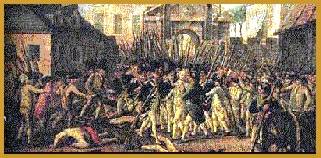|
PinkMonkey Online Study Guide-World History
7.4 Consequences of the Revolution
The French Revolution had many permanent results, which proved to be of great value. This Revolution affected not only the people of France, but also changed the course of human history.
There was a complete collapse of the ancient regime. The French Revolution abolished all elements of feudalism including serfdom. The privileges of the clergy and the nobility also came to an end.

Exhibit 7.4
The reign of terror during the French Revolution
A new order was established based on the ‘Declaration of the Rights of Man’. The Declaration possesses a very important place in the history of man, along with other documents of world - wide importance, such as the English Magna Carta of the 13th century, and the American Declaration of Independence of the 18th century.
The main theme of the French Revolution was "Liberty, Equality and Fraternity". For the French, Liberty meant the rights to property, security of life, to resistance, to worship, to freedom of speech, expression and the press. Equality meant the absence of all elements of feudalism, including serfdom and the privileges of the clergy and the nobility.
The Revolution spread the ideas of nationalism and democracy
throughout the length and breath of the world. The French democratic
slogan, "Liberty Equality, Fraternity," soon became the
watchword of the suppressed and the oppressed peoples of the world.
The philosophy of Locke, Rousseau, Montesquieu and Voltaire awakened
the peoples of the world from their long slumber of ignorance and
united them to fight for the cause of nationalism and democracy.
The whole of Europe felt the impact of the Revolution
of 1789. Indeed, European history merges into the history of one
nation, one event, and one man: the nation is France, the event
is the French revolution, and the man is Napoleon, " a child
of the Revolution".
The Revolution of 1789 sealed the fate of monarchy,
once for all. It paved the way for democracy. The makers of
the Revolution established the idea of a limited monarch. When the
Bourbons came back to the throne, after the rise of Napoleon Bonaparte,
they were expected to play the role of limited or constitutional
monarchs.
The National Assembly, followed by the National
Convention, began several social and economic reforms. It abolished
negro slavery and imprisonment for debt. Women were guaranteed protection
in their property claims in common with men. New laws of inheritance
were passed, by which all heirs were to inherit the property equally.
Napoleon’s conquests had such a great impact that the revolutionary
ideas of nationalism, patriotism and democracy spread throughout
Europe.
The Metric system was another effect of the Revolution, which was later adopted by the whole of Europe and some Asian countries too.
The French Revolution was a beacon of inspiration and hope to suffering humanity, even though it advised moderation in the attainment of freedom.
[next page]
|